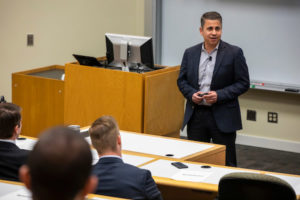By Heream Yang
When it comes to healthcare, Sam Samad has truly done it all. Previously, he served as CFO of Cardinal Health’s Pharmaceutical segment and CFO of Eli Lilly Canada, among numerous other financial leadership roles. Now Samad works at the cutting edge of genomics as CFO of Illumina, a leading American biotech company that generated over $3 billion in revenue in 2018.

Sam Samad at DSS
Samad came to speak at Vanderbilt Business a few weeks ago as part of the Distinguished Speakers Series (DSS). DSS is a student-run initiative that regularly brings in high-profile speakers to share their business insights at Vanderbilt. Past speakers include Lynn Good, CEO of Duke Energy; Anu Aiyengar (MBA’99), Head of M&A North America at J.P Morgan; and Reese Witherspoon, Oscar award-winning actress and founder of Draper James. Hosted by Dean Eric Johnson, the talks are open to all students, faculty, and staff at Vanderbilt.
After sharing some of the groundbreaking medical discoveries that have stemmed from Illumina’s mission “to improve human health by unlocking the power of the genome,” Samad shared the most valuable leadership lessons he has learned throughout his career as a financial leader in the healthcare space. Here are Samad’s top five takeaways for aspiring business leaders:
1. Invest in the future.
Sponsorship has played a pivotal role in Samad’s path to becoming CFO. “The reason I’m here today is because a couple of people put a lot of faith in me,” he said. “They said, ‘We think you’re going somewhere, you need a lot of work, you’re nowhere near the finished product, but we’re willing to invest in you and make you better because you’re going to make us better.’”
Samad encourages leaders to pay it forward by looking out for top talent and giving them opportunities to grow. “You are not just invested in your own success,” he said. “You are invested in the success of a lot of others. Make sure you identify those people… Make sure they know that you’ve put your faith in them because it makes a world of difference when you invest in them early.”
2. Develop a flexible career blueprint.
After getting his MBA, Samad knew that he wanted to become a CFO of a healthcare company one day. While he developed a plan for reaching his goal, he also remained open to the countless opportunities that life threw his way. “I never thought I’d be a sales manager, I never thought I’d manage the China business for Cardinal Health,” Samad said. “If you asked me fifteen years ago, I would have said I’d probably be in pharma one day… but I kept it very flexible. Think about where you want to be, and within that there’s probably an ocean of space that you can play in.”
3. Manage by motivation.
As a sales manager, Samad tried to manage by metrics, and although his attempts worked to a certain extent, he became far more successful when he tailored his management approach to each individual employee. “Different people get motivated different ways. Make sure you identify that early… If it’s a salesperson mom, for instance, she’s very motivated in me helping her get her day done early so that she can go home, tuck her kids in bed… and then she can finish up her admin tasks after that,” he explained. “She’s very motivated by knowing I can help her streamline some of that non-value-added noise in her life… You need to make sure that you adapt very specifically to the person that’s in front of you.”
4. Let people go when they’re ready to go.
Letting an employee go is one of the toughest decisions managers face. As hard as it can be, Samad encourages leaders to be deliberate and decisive in letting someone go. “Managing people is a very big responsibility, one that’s not to be taken lightly, and you should never, ever be premature in your judgment in terms of whether someone’s going to make it or not, but you also have to be decisive,” Samad said. “When I talk to fellow CFOs, I said, ‘What was your biggest learning?’ To a fault, six times out of 10, they would come back to me and say, ‘I waited too long before I made a decision… on a bad performer.’”
5. Earn your spot at the table.
Over the years, many employees have approached Samad for advice on being included in senior staff meetings. “The first thing I say to that is, ‘What have you done to get close to them? How have you earned that place at the table? What have you learned about their business?’” Samad said.“If they are not inviting you, in a few cases, it might be that they are maybe not being inclusive enough and I need to have that conversation with them. But in a lot of cases, in my experience, I found out that it’s usually because their finance partner is not delivering the value they want them to deliver… So, a lot of times, it’s not being entitled to be at the table, it’s how you earn (the right) to be at the table.”
Want to become a business leader yourself? Learn more about the Leadership Development Program (LDP) at Vanderbilt Business.
The DSS speaker series is particularly funded by The Alec and Susan Taylor Visiting Speakers Fund.